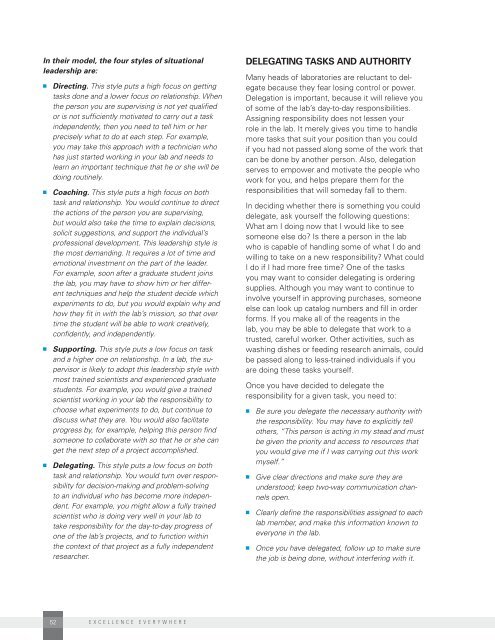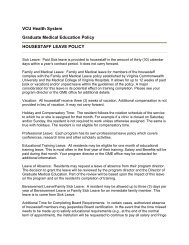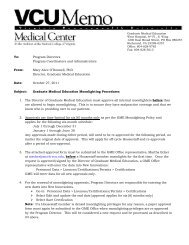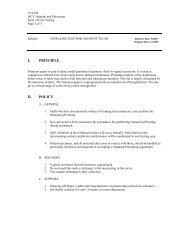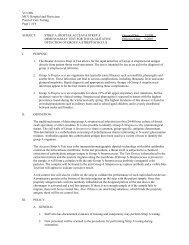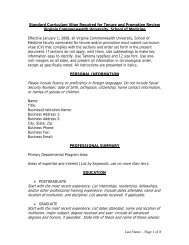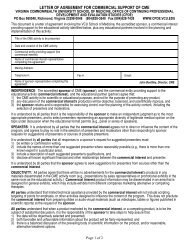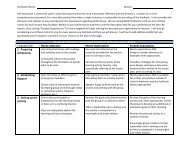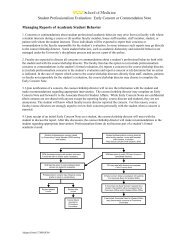In their model, the four styles <strong>of</strong> situationalleadership are:n Directing. This style puts a high focus on gettingtasks done and a lower focus on relationship. Whenthe person you are supervising is not yet qualifiedor is not sufficiently motivated to carry out a taskindependently, then you need to tell him or herprecisely what to do at each step. For example,you may take this approach with a technician whohas just started working in your lab and needs tolearn an important technique that he or she will bedoing routinely.n Coaching. This style puts a high focus on bothtask and relationship. You would continue to directthe actions <strong>of</strong> the person you are supervising,but would also take the time to explain decisions,solicit suggestions, and support the individual’spr<strong>of</strong>essional development. This leadership style isthe most demanding. It requires a lot <strong>of</strong> time andemotional investment on the part <strong>of</strong> the leader.For example, soon after a graduate student joinsthe lab, you may have to show him or her differenttechniques and help the student decide whichexperiments to do, but you would explain why andhow they fit in with the lab’s mission, so that overtime the student will be able to work creatively,confidently, and independently.n Supporting. This style puts a low focus on taskand a higher one on relationship. In a lab, the supervisoris likely to adopt this leadership style withmost trained scientists and experienced graduatestudents. For example, you would give a trainedscientist working in your lab the responsibility tochoose what experiments to do, but continue todiscuss what they are. You would also facilitateprogress by, for example, helping this person findsomeone to collaborate with so that he or she canget the next step <strong>of</strong> a project accomplished.n Delegating. This style puts a low focus on bothtask and relationship. You would turn over responsibilityfor decision-making and problem-solvingto an individual who has become more independent.For example, you might allow a fully trainedscientist who is doing very well in your lab totake responsibility for the day-to-day progress <strong>of</strong>one <strong>of</strong> the lab’s projects, and to function withinthe context <strong>of</strong> that project as a fully independentresearcher.Delegating Tasks and AuthorityMany heads <strong>of</strong> laboratories are reluctant to delegatebecause they fear losing control or power.Delegation is important, because it will relieve you<strong>of</strong> some <strong>of</strong> the lab’s day-to-day responsibilities.Assigning responsibility does not lessen yourrole in the lab. It merely gives you time to handlemore tasks that suit your position than you couldif you had not passed along some <strong>of</strong> the work thatcan be done by another person. Also, delegationserves to empower and motivate the people whowork for you, and helps prepare them for theresponsibilities that will someday fall to them.In deciding whether there is something you coulddelegate, ask yourself the following questions:What am I doing now that I would like to seesomeone else do? Is there a person in the labwho is capable <strong>of</strong> handling some <strong>of</strong> what I do andwilling to take on a new responsibility? What couldI do if I had more free time? One <strong>of</strong> the tasksyou may want to consider delegating is orderingsupplies. Although you may want to continue toinvolve yourself in approving purchases, someoneelse can look up catalog numbers and fill in orderforms. If you make all <strong>of</strong> the reagents in thelab, you may be able to delegate that work to atrusted, careful worker. Other activities, such aswashing dishes or feeding research animals, couldbe passed along to less-trained individuals if youare doing these tasks yourself.Once you have decided to delegate theresponsibility for a given task, you need to:n Be sure you delegate the necessary authority withthe responsibility. You may have to explicitly tellothers, “This person is acting in my stead and mustbe given the priority and access to resources thatyou would give me if I was carrying out this workmyself.”n Give clear directions and make sure they areunderstood; keep two-way communication channelsopen.n Clearly define the responsibilities assigned to eachlab member, and make this information known toeveryone in the lab.n Once you have delegated, follow up to make surethe job is being done, without interfering with it.52 excellence everywhere
n When you delegate authority to someone, be sureto back that person up when his or her authority iscalled into question.n Distribute responsibilities fairly among members <strong>of</strong>the lab.Keep in mind that the people to whom youdelegate may view problems that arise as personalfailures or as letting you down. They may thereforeput <strong>of</strong>f telling you about problems. Taking thetime beforehand to communicate what shouldhappen, and anticipating any potential problems,may save you headaches later. You do not want toadd to your own burden by having to micromanageyour delegations, but sometimes putting sometime into seeing to it that the work starts <strong>of</strong>f wellis all it takes to ensure a successful transition toyour delegates’ ability to work independently.Building and Sustainingan Effective TeamToday, more than at any other time in history,science is a team sport—and the teams keepgetting bigger. Your job as a leader includesmaintaining good working conditions so that yourgroup can be productive. Recognizing and dealingwith low morale or bad feeling arising among yourworkers (or between your workers and yourself)requires most people to pay more attention tohuman relationships than they did before takingon a leadership role. For many kinds <strong>of</strong> work, youneed to integrate people who have different kinds<strong>of</strong> technical expertise and backgrounds. Regardless<strong>of</strong> the size <strong>of</strong> your lab or your group, thereare some general guidelines for keeping the teammembers motivated and working effectively, fromcommunicating and giving feedback to settingspecific rules <strong>of</strong> behavior. They are discussed inthe sections below.Communicating Within the LabYou should communicate with laboratory memberson a daily basis if possible. If you are still doingexperiments at the bench yourself, you will beaccessible to your lab members. But if you spendmost <strong>of</strong> your time in your <strong>of</strong>fice writing papersand grants or handling other responsibilities, it willmake a big difference to your group’s researchproductivity if you make an effort to walk aroundthe lab frequently (on the scale <strong>of</strong> at least once aday, if you can) and informally chat with people.Keeping your <strong>of</strong>fice door open when you do notneed privacy or quiet sends the message that youare approachable and available for scientific andpractical questions about the work in the lab. Ifyou would like to be approachable but your manyobligations prevent you from having an “opendoor policy,” try establishing a regular schedule<strong>of</strong> hours during which people from your lab groupcan reliably get a moment <strong>of</strong> your time withoutthe formality <strong>of</strong> setting up an <strong>of</strong>ficial meeting.In addition to these informal interactions, formalmeetings are an organized way to ensure thateveryone is kept informed <strong>of</strong> the group’s activitiesand results and for you to reiterate your expectationsand values. If you have time, it can bevaluable to hold regular goal-setting and evaluationsessions—an annual lab retreat for discussingbig picture issues, regular lab meetings involvingthe full staff, and scheduled one-on-one advisorymeetings and performance evaluations for yourtrainees and employees. Group activities such aslab dinners or outings, held periodically, can also beimportant for building morale and encouraging labmembers to think <strong>of</strong> themselves as part <strong>of</strong> a team.I would add that it is important that the boss,except when out <strong>of</strong> the lab for meetings orother academic commitments, spend most <strong>of</strong>his time in the lab, arriving early in the morningand staying late. Not to give the impressionthat being the boss one has the privilege towork less, no matter the nature <strong>of</strong> your work(desk or bench).”Alberto Kornblihtt, Argentinamanaging your many roles53
- Page 3 and 4:
A R e s o u r c e f o r S c i e n t
- Page 5 and 6:
Table of ContentsVII119PrefaceChapt
- Page 7:
135 Chapter 10E x p a n d i n g Y o
- Page 15 and 16: Q u e s t i o nq&aWhat Is a “Tenu
- Page 17: preparing for immediate submission,
- Page 22 and 23: Practicing the Talkn Practice your
- Page 24 and 25: your one-on-one interviews you have
- Page 26 and 27: If talking directly about money is
- Page 28 and 29: When the institution responds and y
- Page 30 and 31: equipment and supplies. Maintenance
- Page 32 and 33: Q u e s t i o nq&aIs your instituti
- Page 34 and 35: Working With Human SubjectsWhether
- Page 36 and 37: RESPONSIBILITIES BEYONDTHE LABORATO
- Page 38 and 39: UNDERSTANDING YOURINSTITUTION AND H
- Page 40: Criteria for PromotionStructure of
- Page 45 and 46: Q u e s t i o nWhat’s in a Name?q
- Page 47 and 48: Screening ApplicantsWhen you review
- Page 50 and 51: Interpersonal Skillsn How important
- Page 52 and 53: Multinational Organizations are hir
- Page 54 and 55: n If there is an office that handle
- Page 57 and 58: n Seek funding and publish papers (
- Page 59 and 60: In fact, even though you yourself h
- Page 61: n Craft a statement that you feel c
- Page 65 and 66: n Use only pens, preferably with wa
- Page 67 and 68: Strategy sessionsShould you decide
- Page 69 and 70: Finding Good Papers for Journal Clu
- Page 71 and 72: If possible, invite people in your
- Page 73 and 74: Q u e s t i o nq&aHow do I avoid po
- Page 75 and 76: The International Committee of Medi
- Page 77 and 78: Managing Conflictin the LabConflict
- Page 79 and 80: steps for dealing with conflictWhen
- Page 81 and 82: chapter 5managing your time“ Succ
- Page 83 and 84: Check your work: the 90-year though
- Page 85 and 86: n Make and keep appointments with y
- Page 87 and 88: n Help them seek advice without tak
- Page 89 and 90: FAMILY MATTERSMany scientists face
- Page 91 and 92: chapter 6project management“ We m
- Page 93 and 94: My project is to get a grant funded
- Page 95: ObjectivesObjectives are the end re
- Page 98 and 99: The key events schedule and the act
- Page 100 and 101: Microsoft Project, a program that s
- Page 102 and 103: Martin, Vivien. Managing Projects i
- Page 104 and 105: appendix II: Example of a Work Brea
- Page 106 and 107: appendix iv: Example of a Gantt Cha
- Page 108 and 109: e h i n d c l o s e d d o o r s :w
- Page 110 and 111: Who might be interested in supporti
- Page 112 and 113:
Call your program officerProgram of
- Page 114 and 115:
direct costs vs. indirect costsDire
- Page 116 and 117:
RESOURCESAllen, Ernest M. “Why ar
- Page 118 and 119:
the next generation of students (th
- Page 120 and 121:
Seek Feedback through a Formal Peer
- Page 122 and 123:
Encouraging Student Questionsn Do n
- Page 124 and 125:
Here are some ways you can help the
- Page 126 and 127:
n Are there curriculum changes unde
- Page 128 and 129:
a relaxed format for talking about
- Page 130 and 131:
spend in preparing an effective cou
- Page 132 and 133:
The Publishing ProcessTypes of Jour
- Page 134 and 135:
A word about impact factorsThe impa
- Page 136 and 137:
C r e a t i n g a n i n t e g r a t
- Page 138 and 139:
may need to take the first author p
- Page 140 and 141:
submitting image filesToday, most i
- Page 142 and 143:
Submitting your Paper to Another Jo
- Page 144 and 145:
RESOURCESDavis, Martha. Scientific
- Page 146 and 147:
increase your impact as a scientist
- Page 148 and 149:
Q u e s t i o nq&aHow do I communic
- Page 150 and 151:
n Offer criticism and correction in
- Page 152 and 153:
It is important to discuss career g
- Page 154 and 155:
When Mentoring,Advisory, or Supervi
- Page 156 and 157:
For researchers in developing count
- Page 158 and 159:
n Is travel safe and convenient, or
- Page 160 and 161:
n The expected contribution of each
- Page 162 and 163:
Meetings. Set up systems to ensure
- Page 164 and 165:
SPECIAL CHALLENGESFOR THE BEGINNING
- Page 166 and 167:
e an important connection to future
- Page 168 and 169:
The invention of a new method or pr
- Page 170 and 171:
licensee, who can charge others for
- Page 172 and 173:
Most profound for developing countr
- Page 174 and 175:
Finally, the patents have been chal
- Page 176 and 177:
And, India benefited as a supplier
- Page 178 and 179:
paperwork involved in purchasing1.
- Page 180 and 181:
labeling mattersA case in point: In
- Page 182 and 183:
equipment, freeze-drying equipment,
- Page 184 and 185:
Responsibilityfor materialsIf an or
- Page 186 and 187:
Recent Improvementsin Materials Tra
- Page 188 and 189:
“Knowledge is power.” —Sir Fr
- Page 190 and 191:
MOUMemorandum of UnderstandingRFPRe
- Page 192 and 193:
notes continued182 excellence every
- Page 194:
notes continued184 excellence every


